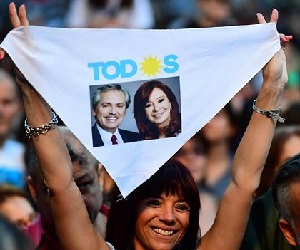 The latest and outrageous episode of the judicial and media war against Cristina Fernández de Kirchner is making the right wing pay a high political cost, incapable of calculating the reserves of political energy accumulated in the people. It is not idle to remember the prosecutor’s request to the accused: 12 years in prison and lifetime disqualification from holding public office.
The latest and outrageous episode of the judicial and media war against Cristina Fernández de Kirchner is making the right wing pay a high political cost, incapable of calculating the reserves of political energy accumulated in the people. It is not idle to remember the prosecutor’s request to the accused: 12 years in prison and lifetime disqualification from holding public office.
Without the prosecutor presenting a single piece of evidence, the right planned to get rid of the indomitable popular leader, fend off her plans to plunder natural resources –lithium in the first place– and dismantle the political, social and cultural rights won during the Kirchner governments. Plans, it should be underlined, that are of the greatest interest to the United States, as has been more than demonstrated, but was once again made clear in the recent interventionist statement by Marc Stanley, that country’s ambassador in Buenos Aires.
The most important characteristic of leaders of Cristina’s stature is that of making large collective subjects feel represented by them. When it comes to Argentina, this phenomenon is necessarily and inevitably colored by Peronism, the political identity that –with its marked contradictions– has given way to national progress towards the goals of social justice, democracy, national sovereignty and Latin American and Caribbean unity. It is easy to understand, therefore, that since the first government of Juan Domingo Perón, the main political objective of the Buenos Aires oligarchy and US imperialism has been the elimination of Peronism, especially in its aspects closest to popular desires. To achieve this today, Cristina’s political ban is a fundamental step. What did not cross the minds of the designers of the judicial-media execution against her is the enormous popular solidarity that it would unleash in her favor.
The attack against Cristina stimulated spontaneous mobilizations throughout the country, even in provinces such as Córdova and Rosario, without Peronist lineage. Meanwhile, in Buenos Aires, the self-convened gathered at the corner of Uruguay and Juncal streets, where the building where the vice president resides stands. As Stella Calloni stated when reviewing the unexpected popular overflow (La Jornada, Mundo section, 8/29), although it may seem so, people have not forgotten the achievements of the 12 years of Néstor and Cristina’s government.
But then came the second and serious error from the macrista field. Faced with the energetic but joyful and peaceful reaction of solidarity towards Cristina from young people, the elderly, workers and residents of disadvantaged neighborhoods, the right-wing government of the city of Buenos Aires found no other response than repression, using its police force. In an illegal action, they fenced off the aforementioned corner at dawn from Friday to Saturday and surrounded it with a shock police group, supported by hydrant trucks, and then attacked the mobilized with sticks, water jets and mustard gas grenades. Which in turn caused the indignation of those gathered there to increase and new groups to come. In a provocative attitude, plainclothes policemen took photos of the attendees, another illegal act, and harassed, pushed and insulted legislators and officials of the governing Front of All who had been present.
It was probably their presence and the pressure exerted by the federal government that prevented the incident from escalating further. The fact of the dump trucks with stones found by the protesters already used by the macrismo to arm provocateurs when it occupied the Casa Rosada is not minor. In this situation, it transpired that former President Macri and the president of the PRO (party of the former right-wing president), Patricia Bullrich, censured the capital’s head of government, Horacio Rodríguez Larreta, for not having been tougher against the protesters.
It should not be surprising then that, as Cristina suggested, it was Bullrich herself who, when the 2001 crisis broke out, suggested to President De la Rúa that he declare a state of siege, which – I add – led to the murder of 39 protesters. As an attendee at the last luncheon of the PRO leaders (Macri’s party) confided to Page 12, Bullrich called for repression, corchazos with rubber bullets and recalled: “As I did during our government.”
Beyond the presidential ambitions and competition to be the toughest of Macri, Larreta and Bullrich, his words should not be taken lightly. The Argentine situation has become hopeful, yes. But the elections are more than a year away. Victory with IMF adjustment will not be easy, even if measures are taken to protect the most vulnerable. It is essential to preserve and strengthen Peronist unity and combativeness driven by popular affection for Cristina and her leadership.
(Taken from La Jornada)